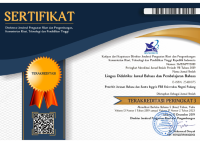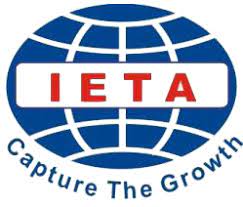UNDERSTANDING TEACHERS’ PROFESSIONAL IDENTITIES THROUGH STORYTELLING WITHIN A POSTCOLONIAL FRAMEWORK
 ),
), (1) English Department FBS Universitas Negeri Padang Jl. Prof. Dr. Hamka Air Tawar, Padang, 25131, Sumatera Barat, Indonesia
 Corresponding Author
Corresponding Author
Copyright (c) 2016 Lingua Didaktika: Jurnal Bahasa dan Pembelajaran Bahasa
DOI : https://doi.org/10.24036/ld.v10i1.6339
Full Text:
 Language : en
Language : en
Abstract
This study provides an account of my doctoral research with respect to the methodological choices that I have made. It focuses on the heuristic value of storytelling for English teachers within a postcolonial setting like Indonesia to construct meanings and understand their experiences ‘consciously within and against accepted forms’ (Miller, 1995, pp. 25-26). It inquires into the finding of ourselves - to understand who we are, who we have been and who we will become for the benefits of the young people in our care. First, I write and construct my autobiographical narrative and then solicit further stories from my teacher interviewees. Our stories allowed us to understand how our professional identities have been influenced and shaped by the social, political, cultural and historical contexts that surround our lives. Placing my study within a postcolonial framework, I was prompted to investigate the ‘heteroglot’ nature (Bakhtin, 1984) of Indonesia as a language community shaped by the history of colonization and the globalization of English. Our stories highlight our efforts to ‘speak back’ to not only our own habitual practices but also to the hierarchical structure of power perpetuated in English. They are not simply told in response to the ‘imagined communities’ of Indonesia as they shape the struggles of those who fought for independence from Dutch rule but are also in conflict with the New Order attempts to impose an ‘official nationalism’ (Anderson, 1991, p. 83) on Indonesians at the expense of any recognition of their regional languages, dialects and cultures.
Key words/phrases: storytelling, professional identities, English teachers, postcolonial framework, habitual practices,
Keywords
References
Anderson, B. 1991. Imagined Communities, Reflection on the Origin and Spread of Nationalism, revised edition. London and New York. Verso.
Anggraeni, D. 2001. February 04).The die-hard colonial mentality. The Jakarta Post. Retrieved from http://www.thejakartapost.com/news/2001/02/04/the-diehard-colonial-mentality.html
Ashcroft, B., Griffiths, G., & Tiffin, H. 1989. (2nd ed.). The Empire Writes Back: Theory and Practice in Post-Colonial Literatures. London: Routledge.
Bahktin, M. M. 1984. Problems of Dostoevsky's Poetics, C. Emerson (Ed. & Trans.), Theory and History of Literature, Minneapolis: University of Minnesota Press.
Budianta, M. 2012. Malang mignon. Cultural expressions of the Chinese, 1940-1960.In Lindsay, J.& Liem, M.H. (Eds). Heirs to World Culture: Being Indonesian, 1950-1965. pp. 255-281.BRILL. http://booksandjournals.brillonline.com/content/ books/b9789004253513s011
Bullough, R.V., & Pinnegar, S. 2001. Guidelines for quality in autobiographical forms of self-study research.EducationalResearcher, 30 (3), 13–21. Retrieved from http://edr.sagepub.com/content/30/3/13.full.pdf+html
Clandinin, J. & Connelly, M. 2000. Narrative inquiry: Experience and story in qualitative research. San-Francisco: Jossey-Bass.
Denscombe, M. 2010. The Good Research Guide: for Small-scale Social Research Projects. Open University Press, Maidenhead.
Doecke, B., Brown, J., & Loughran, J. 2000. Teachers talk: The role of story and anecdote in constructing professional knowledge for beginning teachers. Teaching and Teacher Education, 16, 335-348. Retrieved from http://www.sciencedirect.com/ science/article/pii/S0742051X99000657
Doecke, B. 2013. Storytelling and Professional Learning, English in Australia, 48 (2), 11-21. Retrieved from http://search.informit.com.au/fullText;dn=568065950763619; res=IELHSS
Doecke, B. 2014. A new beginning? John Yandell’s the social construction of meaning: Reading literature in urban classrooms. Changing English, 21(2), 139-149. Retrieved from http://www.tandfonline.com/doi/abs/10.1080/ 1358684X.2014.897040.
Doecke, B., Anwar, D., Illesca, B., (forthcoming). Re-theorizing narrative research and social critique within a postcolonial framework. Springer
Gramsci, A. 1986. Selections from the Prison Notebooks, ed., trans. Q. Hoare and G. Nowell Smith, London: Lawrence & Wishart.
Hamilton, D, 2005. Knowing Practice, Pedagogy, Culture and Society, Volume 13, Number 3, 285 Umeå University.
Miller, J. L. 1995. Trick or Treat? The Autobiography of the Question, English Quarterly, 27(3), 22–26.
Miller, J. L. 2005. Sounds of silence breaking: women, autobiography, curriculum. New York: P. Lang Publishing, Inc.147-163.
Miller, A. 2009. Raging Against the Mass Schooling Machine: Performing Pedagogy against the Grain. Liminalities: A Journal of Performance Studies, 5(2), 1-26. Retrieved from http://liminalities.net/5-2/raging.pdf.
Parr, G. 2010. Inquiry-based professional learning: Speaking back to standards-based reforms. QLD: Post Pressed.
Parr, G., Phan, H. L., Faine, M., & Seddon, T. 2013. Globalisation and its challenges for History teaching.AGORA. History teachers’ association of Victoria, 48 (2): 18-26
Phan, H. L. 2008. Teaching English as an International Language: Identity, Resistance and Negotiation. Clevedon, Buffalo & Toronto. Multilingual Matters LTD.
Phan H. L.. 2009. Strategic, passionate, but academic: Am I allowed in my writing? Journal of English for Academic Purposes, 8(2), 134-146. Retrieved from http://www. hum.uu.nl/medewerkers/m.c.j.kokescalle/sites/competence_mediation/cursusdocumenten/Phan%20Le%20Ha.pdf
Pinnegar, S., & Daynes, J. G. 2007. Locating narrative inquiry historically: Thematics in the turn to narrative. In J. Clandinin (Ed.), Handbook of narrative inquiry: Mapping a methodology (pp. 3-34). Thousand Oaks, California: Sage.
Pratt, M. L. 1991. Arts of the Contact Zone. In P. Franklin (Ed.), Profession 91: 33-40. New York: Modern Language Association of America. Retrieved from http://www.nieuweleescultuur.ugent.be/files/meer_lezen2_pratt.pdf.
Rohmah, N. R. 2008. Facing the complexities of writing: my journey as a learner and teacher of EFL writing in Indonesia. (Unpublished Master’s Thesis).
Rosen, H. 1986. The Importance of Story. Language Arts, (63) Vol. 63, No. 3, Literary Literary Discourse, pp. 226-237: NATE.
Said, E. 1979. Orientalism. Harmondsworth: Penguin.
Said, E. 1991.The World, the Text and the Critic. London: Vintage.
Sikes, P. 2010. The Ethics of Writing Life Histories and Narratives in Educational Research. In A.M. Bathmaker & P. Harnett, (Eds) Exploring Learning, Identity and Power through Life History and Narrative Research (11-24)
London: Routledge.
Sikes, P., & Gale, K. 2006. Narrative approaches to educational research: Research in education.Retrieved from http://www.edu.plymouth.ac.uk/resined/.
Smith, D. 2005. Institutional Ethnography: A Sociology for People. Toronto: Altamira Press.
Talib, I. B. S. 1992. Why Not Teach Non-Native English Literature? ELT Journal, 46(1), 51-55.
van de Ven, P.H. & Doecke, B. (eds). 2011. Literary Praxis: A Conversational Inquiry into the Teaching of Literature. Rotterdam: Sense Publisher
Watson, C. W. 2000. Of Self and Nation, Autobiography and the representation of modern Indonesia. Honolulu. University of Hawai’i Press.
 Article Metrics
Article Metrics
 Abstract Views : 387 times
Abstract Views : 387 times
 PDF Downloaded : 126 times
PDF Downloaded : 126 times
Refbacks
- There are currently no refbacks.
Copyright (c) 2016 Lingua Didaktika: Jurnal Bahasa dan Pembelajaran Bahasa








